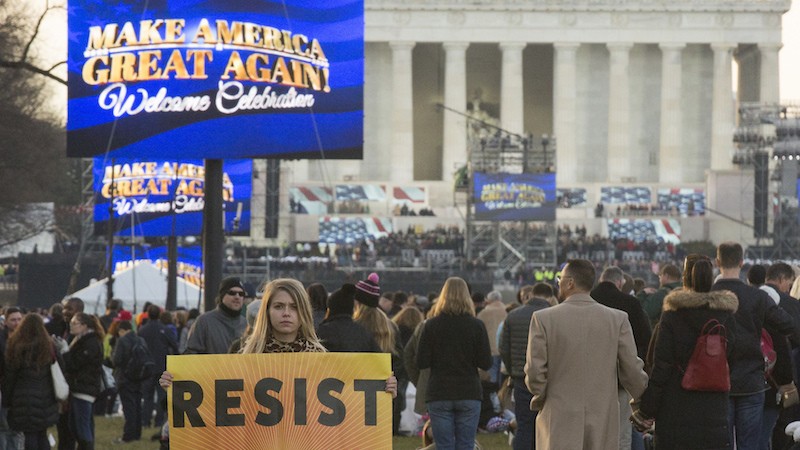“We are going to be praying for this new president,” says Fran Ludwig over the phone from Boston as she takes a break from her morning of babysitting. “We know what he appears to be, but we are praying that he can change.”
On Friday, as Donald Trump takes the oath of office, Ludwig and around 40 others from across the country and across faiths will join together on a conference call and pray not only for the president but for the future of our climate and our society.
Ludwig, a member of the Global Catholic Climate Movement, organised the vigil for those unable to attend a march or a meeting on Friday.
“It’s people wanting to be with others who are concerned. It’s just a way of being together. Praying together,” she says. “There’s no substitute for people being together physically, but some people can’t do that.”
Across America, hundreds, perhaps thousands of such meetings will take place over the coming days as people seek solace, guidance and solidarity in the face of uncertainty.
In Cincinnati, Marylin Wall will be doing what she has done for 30 years – organising. The day after the inauguration she will be leading a climate justice march through her city in solidarity with the hundreds of thousands of women expected to walk in Washington DC.
She says the rise of Trump has utterly deflated her.
“I’m very pessimistic, personally, about how things are going. That doesn’t mean I stop fighting. I can’t stop fighting against this,” says Wall.
All around her, people have been jolted into action that she believes can be sustained. Looking back on three decades of activism, Wall has seen these cycles before.
“There was a lot more galvanising after Bush was elected,” she says, and now after milder eight years under Obama, people were again compelled to act.
“There are so many issues, like women’s rights and climate justice and racism that are all interconnected, they are all about justice. So when you have an assault on any of them, it galvanises people because it is so overwhelming. Because there is such a need to act.”
In order to channel that beyond this weekend, Wall said she would be helping to organise community meetings that gave people the tools to act locally on issues such as climate change. This gives her hope, she said, that after an inevitably rocky ride, things will improve.
“I’m optimistic that people in this country will prevail and turn things around, but it will take some time and there will probably be damage to people in the meantime,” says Wall.
Stephanie Herron will also be helping out at a rally: this one in Wilmington, Delaware. She said the deflation of the election had been replaced by a new energy.
“Right after the election it was a feeling of being utterly heartbroken and terrified for our future. There is no sugar-coating that,” she says. “But as the time has gone on I think the tone has become more hopeful as people have doubled down on their resolve to work for justice and environmental protection on the local level.”
Later next week, such a meeting of local people will be taking place on the banks of the Mississippi in the small town of Alton, Illinois.
Elizabeth Scrafford will be organising a workshop on community activism. She said growing up in northern Idaho meant she knew very well the world Donald Trump’s politics have spoken to.
“I was raised in a very evangelical and conservative community and know many Trump voters,” says Scrafford. “The biggest heartbreak for me has been to see people I love and respect and believe to be good people vote for a man who has made way for so much hate.”
She said many of her friends were heading out into the streets this weekend, either in their hometowns or in DC.
“People are looking for ways to plug in and start strategising – I’ve never seen so many of my friends joining the larger movement for progress,” says Scrafford.
“This work is not about one protest or workshop, but about building a broader movement – with room for all. It’s not just the environment under attack… it’s migrants, union members, Muslims, Jews, the LGBTQ community, and our neighbours of colour.”
Analysis: Why did Obama triumph on climate abroad, but fail at home?
Ludwig’s telephonic congregation will be reading Jewish, Buddhist and Catholic prayers together, as well as non-faith prayers for the planet.
They will also read Martin Luther King Jr: “Darkness cannot put out darkness; only light can do that. And I say to you, I have also decided to stick with love, for I know that love is ultimately the only answer to humankind’s problems. And I’m going to talk about it everywhere I go.”
Ludwig hopes that Trump’s attempt to divide and marginalise will spawn a movement worthy of this ideal. But she says it’s difficult to find that spirit, when the atmosphere of the nation is adversarial and bitter.
“It’s really a tension between the need to stand up and confront some of the issues that we think are not being addressed by the government. But also the need to listen to Martin Luther King and say the only solution to this is love and to try to understand people,” she says. “The big question is whether Trump will even care.”
